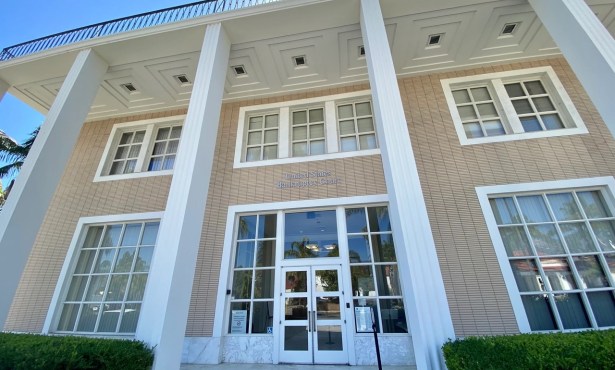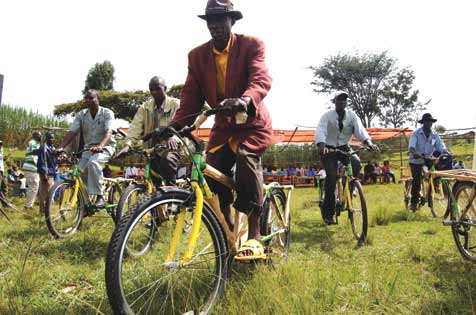
Heart rate through the roof, lungs burning, pedal stroke erratic. As I round a bend in the road, I am hit by a wall of excited screams. Hundreds line the rise to the summit, a tunnel of smiling faces. Like a stage in the Tour de France, hands reach out to give me a push.
But this is not France. This is Rwanda. The cheering crowds are not the rabid Basque fans who fill Pyrenees in July, but Rwandan students finished with school for the day. Yells of komera!(“be strong!”) replace venga! and allez!
Could this really be the country that barely a decade ago filled our television screens with pictures of machete-wielding mobs and mutilated bodies? Where are the pickups full of gun-toting militia? Isn’t this supposed to be one of the most dangerous countries in Africa?
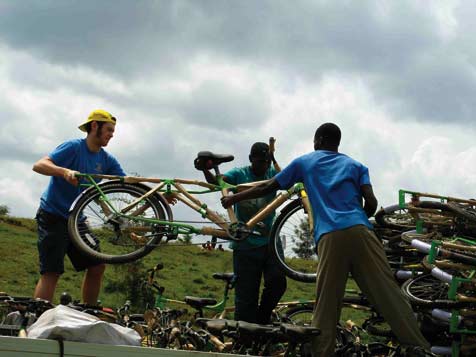
As I have learned from countless Rwandans, these preconceptions couldn’t be further from the truth. Yes, there are still visible signs of the 1994 genocide that left one million Tutsis and moderate Hutus dead. Purple-ribboned memorials dot the countryside. Villagers are missing limbs, eyes, or hands. Urban centers are filled with vacant-eyed, glue-sniffing street children, many genocide orphans. But there is also an undeniable feeling of hope that fills the Land of One Thousand Hills. It is in the smiles of abana (children) and the craggy faces of the wazee (elders), the calloused hands of the fieldworkers and the quick fingers of the basket weavers. That hope, combined with a strong belief in the magic of the bicycle, beckoned me to Rwanda. Sorry, Lance, but in Rwanda, it is about the bike. Cars are rare, the majority of the population relying on the bicycle. It is much more than just a means of transportation: It is a way out and a way up. Up from the wreckage of a horrific genocide, out from the debilitating poverty that consistently ranks Rwanda among the poorest countries in the world.
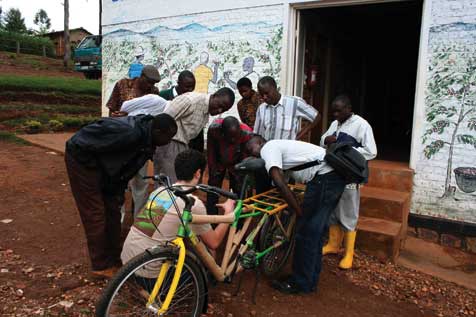
Take Rwandan coffee farmers, for example: Rwandan coffee is universally regarded as one of the finest varieties in the world. It plays a huge role in the country’s post-genocide recovery, comprising nearly 40 percent of Rwanda’s export revenue. Unfortunately, Rwanda’s 450,000 coffee farmers lack the means of transportation to move their harvest from farm to washing station on time. Beans are often delivered behind schedule, preventing farmers from maximizing their profits.
In 2006, mountain bike legend Tom Ritchey recognized this problem on a bike tour in Rwanda. He founded Project Rwanda, a nonprofit dedicated to implementing the bicycle as a development tool and, perhaps more importantly, a symbol of hope in a country desperately seeking both. The project designed a special “coffee bike” that enables farmers to carry 200 kilograms of coffee to washing stations in one trip, twice the quantity previously possible. Equipped with multiple gears (rare in Rwanda), the bike greatly shortens the duration of the farm to washing station trip. The beans are much fresher upon delivery, garnering the farmer on average 15 cents more per pound. During the offseason, the coffee bike provides transportation for the entire family, and is often hired out as a bicycle taxi to generate additional income. With the help of USAID’s SPREAD Project and World Vision Finance, Project Rwanda has helped distribute 1,000 coffee bikes to farmers thus far. The coffee bike has not only given Rwandans an income boost but a means with which to pedal themselves out of poverty.
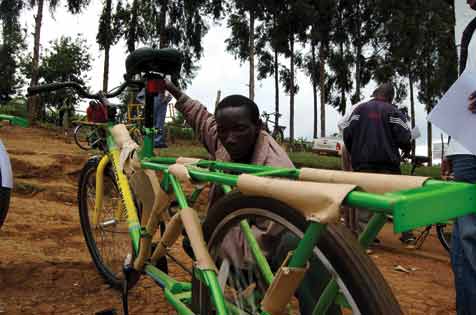
I first learned about Project Rwanda in the pages of VeloNews. Maybe it was my love for bikes, maybe my crazy college-student drive to change the world, but I jumped in without looking back. One thing led to another, and I found myself in Rwanda during summer 2007 with my dad and a group of friends. Bags bulging with tools, we set out to teach bike mechanics to coffee-bikeriding farmers, many of whom had never seen a derailleur before.
None of us would ever see the world, or the bicycle, in the same light again. It is one thing to live to ride your bike. It is another thing entirely to ride your bike to live. The minute I stepped onto the plane departing Kigali, I promised myself that I would return to teach and be taught by a people who truly understand the magic of two wheels. This spring, I found my chance. My Global Poverty and Practice Minor at UC Berkeley required a work study/internship for a development organization. Project Rwanda was an obvious choice. I hoped to help set up bike shops at the coffee cooperatives to help service the growing fleet of coffee bikes, but was prepared for anything. Only a week into my stay, I found myself at the Musasa Cooperative distributing coffee bikes to 100 farmers. Just in case I had forgotten the lessons of the previous summer, Musasa’s proud new coffee bike owners had prepared a review for me. Though we didn’t speak a word of the same language, the bicycle proved a more than adequate translator. Children clamored aboard their parents’ new steeds, giggling when they discovered the bell. Craggy-faced village wazee cracked rare smiles after only a few pedal strokes, children once again. Three generations of farmers mounted the coffee-bearing rack onto the family’s latest addition; “No dad, it goes like this,” I overheard. A dreadlocked farmer, missing a hand, grinned as he attempted a track stand. Female farmers stood proudly next to their coffee bikes as they were interviewed by national television, the first in their families to own a bicycle. I will never forget the smiles at Musasa that afternoon. Anyone who doubts the ability of the bicycle to change the world needs only to look into those eyes. Scars of genocide will still be there, but so will hope. Faces that lost everything just a decade ago will sparkle. As with the abana who cheered me up that hill, they have been renewed with hope for their future. The magic of two wheels.



